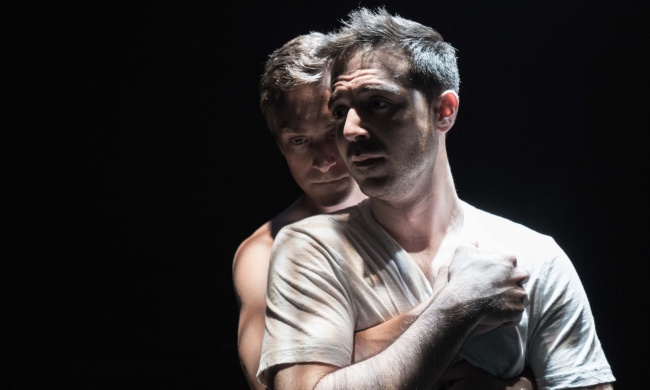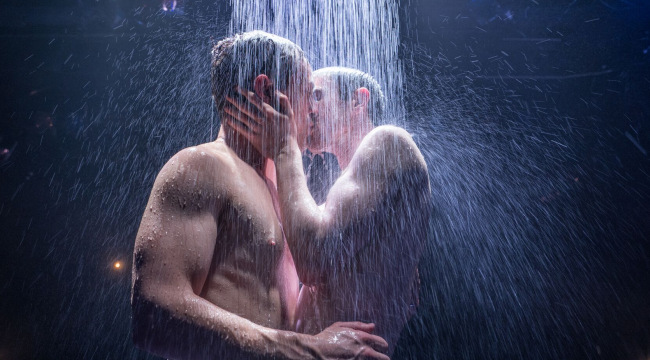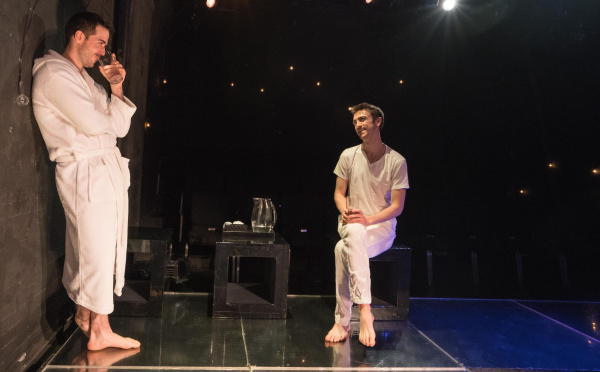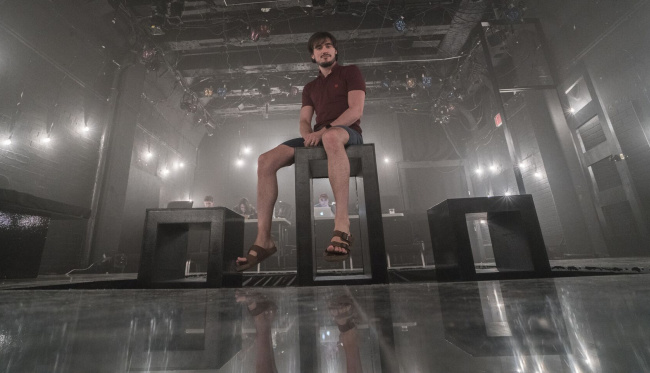Playwright S. Asher Gelman writes about the time he and his husband discovered the merits of an open relationship, and how it affected his ground-breaking play, Afterglow.
Three years ago, I fell in love; it nearly destroyed my marriage. This past summer, my play, Afterglow, which I directed and wrote based on that experience, premiered Off Broadway. Response to the piece has been, for the most part, favorable, but more importantly, it seems to be opening up a larger conversation about relationships in general.
My husband, Mati, and I have always valued great communication above all. It’s the thing that makes our relationship work. We’re not afraid to tell each other exactly how we feel, even if it hurts. We’ve been together for almost nine years, with the past four being open.
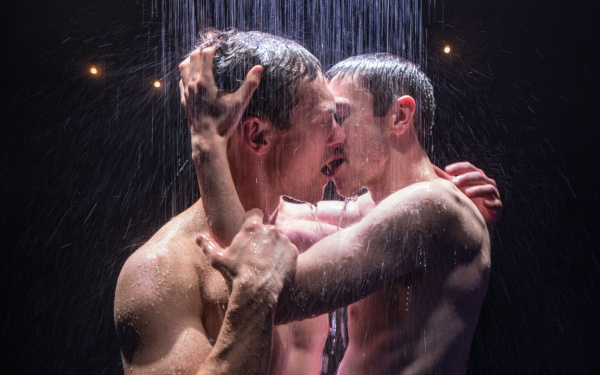
When we started dating, we were both fiercely monogamous and had no reservations about telling people exactly how we felt about the joke of non-monogamy. We believed that couples who were in open relationships were kidding themselves or were glorified roommates.
About a year and a half into our relationship, we participated in our first threesome. We were terrified that inviting another man into our bedroom might destroy our relationship. It didn’t.
Over the next several years, we dabbled in different permutations of non-monogamy until we reached our current arrangement, the one we’ve been in for the past four years: we don’t spend the night apart (unless one of us is traveling) and we don’t keep secrets.
Almost two years ago, we moved from Tel Aviv to New York City, and were introduced to a whole new approach to sexuality. Sex in this new city is different. We’ve found that New Yorkers aren’t ashamed of sex.
In Tel Aviv, we couldn’t create friendships with people we were sleeping with, and couldn’t have sex with previously established friends. This has not been the case in New York.
We make many of our friends through sex, and initiate sexual relationships with people we previously befriended outside of the bedroom. Many of those friends have sex with each other, and there is no awkwardness or discomfort among them.
Our families know we are open and support us, even if they prescribe to a different lifestyle. Just the other month, we were having lunch with my parents and a dear friend of ours. My mother asked how he knew us. Unflinchingly, he told them that we met on Grindr.
Many of our friends there had no idea. We constantly felt guilty for presenting as monogamous, especially whenever those friends would compliment us on our relationship. We agreed that we no longer wanted to lie to people anymore, and if people didn’t agree with our choices, they didn’t have to be a part of our lives. We didn’t realize just how much we had been keeping track of our lies until we just stopped telling them.
Open relationships have largely endured a bad reputation, which is why we were reluctant to share ours publicly.
They are often seen as either a convenient way to avoid commitment or as a last-ditch effort to save a relationship that isn’t working, and so, when those relationships end, the finger gets pointed at non-monogamy as the culprit, not the relationships themselves.
This is not to say that non-monogamy has not presented problems. My husband and I get jealous of each other and sometimes we have to check ourselves to make sure our extramarital relationships don’t cross any lines, which is a risk most people cite when debating whether or not to explore non-monogamy.
My purpose for sharing this information (my husband would call it over-sharing, and he’s not completely wrong) is that I believe that we are always looking for someone to publicly admit to doing the thing that we ourselves are doing privately, but are hesitant to share.
This inspired me to write my play, Afterglow. The play is loosely based on a relationship I had three years ago with a man who was not my husband. Last year, I decided to turn my experience, which came dangerously close to ending my marriage, into a play.
The New York Times referred to the characters in our show as being “proudly polyamorous,” the obvious implication being that polyamory, and non-monogamy in general, isn’t something to be particularly proud of.
Even in 2017, we still have to challenge public perception when it comes to non-traditional relationship structures. We still live in a society which, for the most part, looks down on non-monogamy, despite the fact that there is an already large and growing number of us who currently prescribe to those types of relationships.
The purpose for creating Afterglow was to begin a public conversation about what has, until now, been mostly a private one – one about love, about loyalty, about trust; about relationships in general – all types of relationships.
It’s a conversation that my peers are having constantly, particularly, but by no means exclusively, by members of the queer community. However, this conversation is still, for the most part, happening behind closed doors.
There is still so much stigma surrounding this issue that people on all ends of the sexual spectrum are afraid of the implications of even bringing it up.
One friend asked me recently how to broach the issue with his wife. I told him he needed to be honest and forthcoming both with her and with himself and that there is a very real possibility that she may not share in his desire to open their marriage.
I asked him if he really believed he could be happy being monogamous, despite his desire to explore non-monogamy. He said he could be, which was a great relief to both of us.
Conversely, I have lots of friends who simply refuse to bring their partners to see the play, for fear that it will introduce an uncomfortable issue.
People are afraid of revealing a facet of themselves that their partner won’t like, or discovering a facet of their partner that they won’t like. While it is easier to simply ignore a potential issue than to face it head on, is avoidance really the best approach?
People are worried that this conversation, if had, could lead to the end of their relationship, but if a conversation, no matter how difficult, runs the risk of ending a relationship, is that relationship strong enough to exist in the first place?
Is it better to live in the bliss of ignorance? Do people really want to spend their lives with someone they cannot even entrust to handle a difficult conversation?
Our open marriage has forced us to become better communicators, and our relationship has been strengthened by those difficult conversations. Non-monogamy hasn’t been without its hiccups, the most major of which inspired the play.
I want to present a candid and current picture of what relationships look like in 2017, and I believe that much of our audience would say that the play succeeds in doing so.
I want people to witness the show and to carry the experience of it with them after the lights come up and they leave the theater. It’s not an easy piece to watch; the way you relate to the characters and their story will, most likely, be determined by your own relationship history.
The theater is split in half; the stage is in the center of an audience that faces itself. This set-up allows the piece to act as a kind of mirror, to force us to reflect on our own lives; for us to see ourselves in the piece, not just as observers, but as participants.
I want our audience members to confront difficult issues in their own lives and relationships after experiencing Afterglow.
So, if you find yourself in New York, I encourage you to find a friend, a lover, a spouse, a family member, whoever, and come share an hour and a half with us at The Davenport Theater, and, when it’s over, go sit somewhere and have a long, honest conversation.
S. Asher Gelman is a director, choreographer, actor, dancer, and playwright. He lives in New York City with his husband, Mati. Afterglow is his first play.


